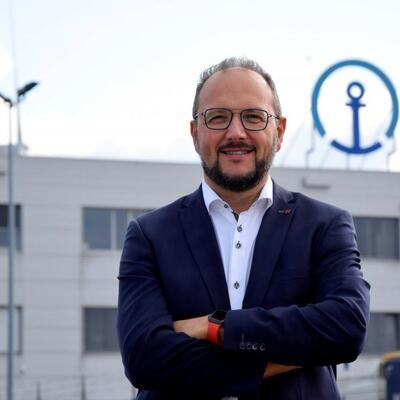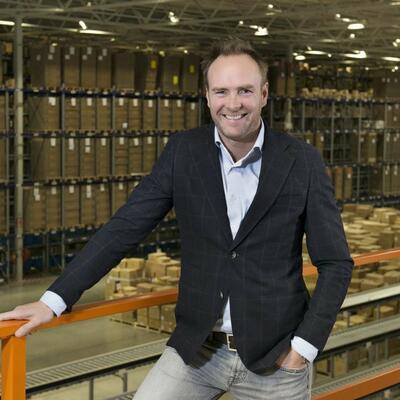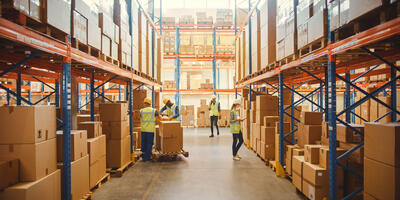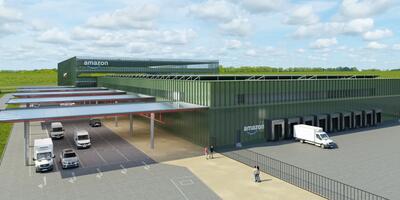
E-commerce
Ready to conquer Europe – and the world – with your products through e-commerce and e-fulfilment? Look no further than Flanders, the northern region of Belgium, for the ideal home base. This physically small but economically mighty region has everything you need for e-commerce success, from a strategic location to logistics expertise, high-quality infrastructure, special tax and labor incentives and more. Keep reading for all the details and learn how leading multinational logistics groups like Bleckmann and Kuehne+Nagel make big things happen.
It’s ‘all systems go’ for the convenience of e-commerce
85 million, or 2.7 per second: that’s how many e-commerce transactions were handled in 2019 in Belgium alone, and the future looks blindingly bright.
Keeping pace with the rise in consumer appetite for the convenience of online shopping, e-commerce has been building up steam in Belgium’s northern region of Flanders for the last handful of years. In fact, the local e-commerce market has grown by over 15% per year between 2017 and 2020. This trend is a clear indication that e-commerce in Belgium and Flanders as a region is now a fully-fledged pillar of the economy.
However, there is still huge untapped growth potential here – which leaves plenty of room for smaller companies, local businesses and niche brands to make their mark on the world.
Opportunity abounds for companies of all sizes
13 new e-commerce players enter the market in Belgium and Flanders as a region every day. The reasons are plentiful: from new tech that makes it easier to start up and plenty of expertise at hand to Flanders’ excellent logistics infrastructure required to support even the most ambitious e-commerce firm. Flanders offers everything businesses need to set their e-commerce sights high.
Even more interesting, 25% of the total value of e-commerce transactions – equal to over EUR 2 billion – comes from abroad (source: SafeShops.be). Clearly, web shops in Belgium and Flanders are more and more appealing to consumers – not only in the neighboring countries of France, the Netherlands, the UK and Germany, but beyond.
This proves that it’s the perfect moment for your business to expand into new markets and diversify your growth opportunities – from Flanders.
Where the ‘e’ in ‘e-commerce’ stands for ‘excellence’
The trends are compelling, the opportunities are numerous – but what’s behind Flanders’ growing e-commerce and e-fulfillment success story? The answer has everything to do with technology, people, location and legislation.
World-class logistics, competitive prices
Out of 160 countries, Belgium and Flanders as a region come in at #3 in the world for overall logistics performance according to the World Bank’s Logistics Performance Index. When it comes to international shipments, Belgium and Flanders easily outperform Germany, Spain, Sweden, Austria and other leading players, outshining the competition in 2 key areas: the ease of arranging competitively priced shipment and punctual shipment and delivery.
Flanders offers world-leading international freight transport – crucial characteristics for reliable supply chains, production planning and export. Combined with the region’s central location in the heart of Europe’s most prosperous zone and the presence of top 3PL, 4PL and specialized e-fulfillment players, the advantages for e-commerce and e-fulfillment can’t be beat.
Real affordable real estate
Your business will find all the high-quality space it needs to process goods, in close proximity to top ports, in cities of Flanders. Even better: the price is right. Warehouse rental prices in Flanders are some of the lowest in Europe, at EUR 43 to EUR 48 square meters per year (source: Cushman & Wakefield, 2020).
Skilled people
The universities and university colleges of Flanders offer plenty of educational opportunities for people seeking specialized careers relevant to e-commerce and e-fulfilment.
Pairing this strong expertise up with natural language skills and an international, multicultural mindset, the region’s workforce will endow your business with the operational excellence and high-quality customer service capabilities required for e-commerce expansion.
How Flanders supports your e-commerce activities
Cross-border expansion is the key to business growth – but it’s important to have a good understanding of relevant requirements, regulations and legislation to pave the way for smooth international commerce.
Introducing the BE-GATE customs platform
Belgium, of which Flanders is the northern region, actively seeks to facilitate and simplify import and export, developing the innovative BE-GATE customs platform in the process. This innovative platform is unique in Europe and was specifically designed to meet the import and export needs of e-commerce players, completely free of charge.
It significantly accelerates customs processes for economic operators by:
Lighter VAT rules pave the way for an ‘electronic single market’
Today, foreign businesses must register for and pay VAT when they pass the sales threshold of EUR 35,000 in Belgium. That’s all about to change.
Europe is modernizing the rules pertaining to VAT levied on goods or services sold online. The new rules will enter into force on 1 July 2021 and include:
These new rules mean that online goods and services are taxed in the same way as their physical equivalents in shops, and VAT will be charged in the member state where the EU consumer is based, regardless of where the retailer is based.
Special labor exemptions for e-commerce
In 2017, an exception to Belgian labor laws was introduced for all activities related to e-commerce. Shipping packages at night is fully allowed. This allows companies to more flexibly respond to online demand and delight their customers with even better services.
Tax incentives for companies active in e-commerce
Thanks to a number of deduction schemes and financial grants, it’s possible to reduce your tax burden to as low as 26.3%! Discover your options:
Customs warehousing
There are two kinds of customs warehouses where you can store your goods: public and private customs warehouses. The first type can be used by any company. However, the latter type can only be used by holders of a Customs Warehousing (CW) authorization.
As a license-holding importer with a private customs warehouse, your company may be able to:
Furthermore, under the Customs Warehousing (CW) procedure, it’s possible for your business to store goods from outside the EU in a public customs warehouse – delaying the payment of import duties, VAT and other charges until the goods are cleared for transportation.
There are 3 types of public customs warehouses:
When it comes to private customs warehouses, the authorization holder also acts as the procedure holder, making them solely responsible for the warehouse procedure.
For more information on customs authorizations and services, visit the website of the Federal Public Service Finance (Customs and Excises).




